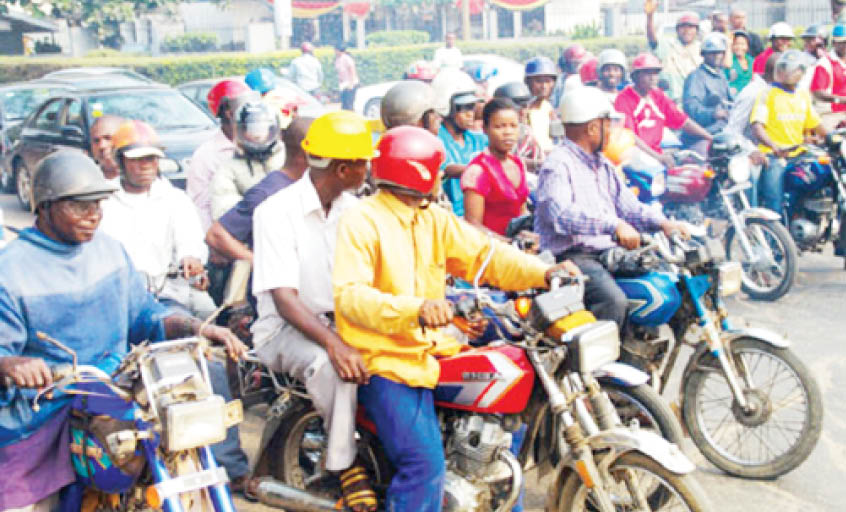Lagosians react 4 months after Okada ban
Four months into the ban on the commercial motorcycle (Okada) operations in 10 LGAs and 15 Local Council Development Areas (LCDAs) by the Lagos State government, residents have expressed their feelings on the action. While some of the residents have commended the development as it has helped to curb road accidents, others expressed displeasure about […]

Cross section of okada riders
Four months into the ban on the commercial motorcycle (Okada) operations in 10 LGAs and 15 Local Council Development Areas (LCDAs) by the Lagos State government, residents have expressed their feelings on the action.
While some of the residents have commended the development as it has helped to curb road accidents, others expressed displeasure about the difficulties the development has brought in commuting daily.
The ban has witnessed stricter enforcement than previous ones which were often relaxed after a few weeks.
However, some Okada riders still ply the restricted areas under difficult circumstances which have led to cases of clashes with security operatives.
During a seven-day warning strike embarked upon by Lagos commercial bus drivers under the aegis of the Joint Drivers Association of Nigeria (JDWAN) to protest against extortion by officials of the Lagos State Parks and Garages Management, it was observed that the Okada riders were permitted to operate in some of the restricted areas without harassment by security operatives.
A commuter in Oke-Aro, Ogun State, who works in Apapa, Lagos, Martins Egbadon, who noted that plied the road every day, connecting through Iju-Ishaga to Oshodi-Apapa, commended the development, saying it had reduced road accidents.
He said, “In a way it is a good development because those riders ride recklessly. I know what I see along the Agege to Ikeja axis; different kinds of motorcycle accidents. If you even tell them to drive carefully, that is when they intensify the rough riding. Today, the accident rate has reduced.
“On the other hand, it is not a good development because roads are being constructed in every part of Lagos and this is causing serious traffic.”
Damola, an entrepreneur who plies the road from Ikotun to Mushin, where he buys materials for shoe production, said the ban made him spend long hours on the road.
He said, “I go to Mushin from Ikotun at least three times a week to buy materials. I spent N1,000 on Okada going and coming with a maximum of 40 minutes on the road. Since the ban, I have spent the same amount, with two to three hours on the road; depending on how heavy the traffic is. We usually board motorcycles because of traffic, which is usually as a result of the bad roads and impatience.”
Mercy Amaechi, a makeup artist who resides in Alaba but has most of her clients on Lagos Island, said the ban often made her go late for appointments.
She noted that in her area the traffic was mostly caused by trailers heading to Badagry.
She said, “I don’t really like sitting in commercial buses because of the discomfort, holdup and stress that come with it. Okada is expensive but it’s the fastest means of transport here in Lagos,” adding that, “Also, as a makeup artist, when I have jobs, I have loads to carry and carrying them into a commercial bus is risky. Conductors don’t handle my bags with care which can damage my products and equipment. The only alternative is using a taxi which is very expensive.”
A resident of Ikorodu, Ayobami Okerinde, said, “Lagos is synonymous with heavy traffic, and Okada has been the fastest way to move considering 8am as the resumption time in most places of work.
“The effect has made people leave their homes very early, putting them at risk of attacks and robbery. Also, the prices of bus fare have skyrocketed over the last few months of the ban. People now have to pay more and up to 100 per cent of what they paid earlier, and most people now have to trek.”
Oluwaferanmi Caleb lamented the number of hours he spends going to work in the morning and returning home in the evening alongside the extra cost incurred due to traffic jams.
He said, “People have to go to work and go home. Since Okada has been banned, we now have more people struggling for buses at bus stops. In an area like mine, booking Uber is even out of the question because the fee is as high as N10,000 for one trip.
“Even when I leave my home around 5:30am or 6am, I still get to work late depending on the traffic situation. In the last five months, I spent almost N4,000 daily on transportation from Mainland to Island, feeding not inclusive. I also get to work late because there are no bikes to manoeuvre the traffic.”
